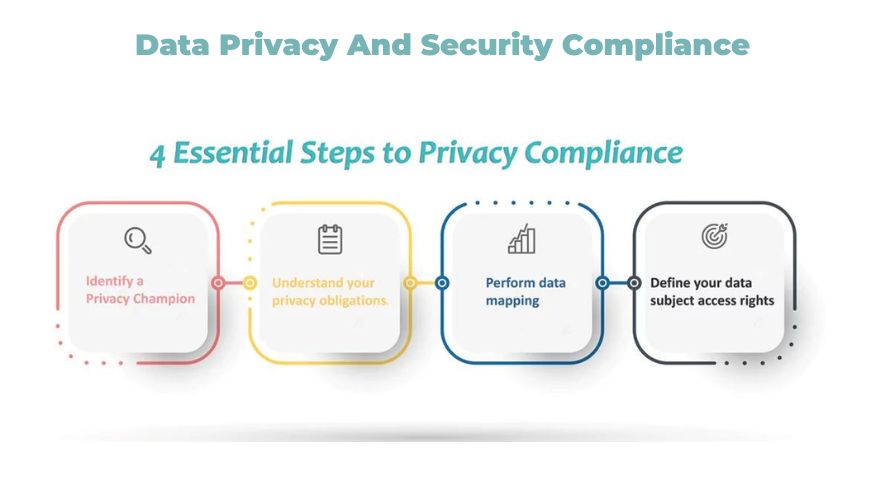In an era defined by the digital age, data has become a currency of immense value. With the increasing volume of personal and sensitive information being collected and processed, ensuring data privacy and security compliance has never been more critical. Not only does it protect individuals’ rights, but it also safeguards your organization from potential legal and reputational consequences. We’ll demystify data privacy and security compliance, providing you with an optimized and easy-to-use guide.

Understand the Basics
- Data Privacy: This pertains to an individual’s right to control their personal information and how it’s collected, used, and shared. Compliance with data privacy regulations ensures that you handle personal data respectfully and responsibly.
- Data Security: This involves measures to protect data from unauthorized access, breaches, or theft. It encompasses various technologies, processes, and policies to safeguard information.
Applicable Regulations
Several regulations worldwide govern data privacy and security. The most notable ones include:
- General Data Protection Regulation (GDPR): Applicable in the European Union, GDPR sets strict rules for the collection and processing of personal data.
- California Consumer Privacy Act (CCPA): Relevant for businesses dealing with California residents’ data, CCPA grants consumers greater control over their personal information.
- Health Insurance Portability and Accountability Act (HIPAA): Enforced in the healthcare industry in the United States, HIPAA regulates the protection of patients’ medical records.
Data Inventory
Begin by identifying and cataloging all data collected, stored, or processed by your organization. This includes personal information, financial data, and any other sensitive information. This step is crucial in understanding what you need to protect
Data Mapping
Create a visual representation of how data flows within your organization. This mapping helps identify vulnerabilities and ensure data doesn’t end up in unintended places.
Data Minimization
Collect only the data necessary for your intended purpose. The less data you have, the less you need to protect.
Privacy Policies
Draft clear and concise privacy policies that inform individuals about how their data will be used. Ensure that these policies are easily accessible to everyone.
Consent Mechanisms
Implement mechanisms for individuals to provide informed consent before collecting their data. Make it easy for them to revoke consent as well.
Data Security Measures
Invest in robust data security measures, including encryption, access controls, and regular security audits. Regularly update your software and systems to patch vulnerabilities.
Data Breach Response Plan
Develop a plan for responding to data breaches promptly. This should include notifying affected individuals and relevant authorities as required by law.
Employee Training
Educate your employees on data privacy and security best practices. Human error is a leading cause of data breaches, so knowledgeable staff is your first line of defense.
Compliance Monitoring
Regularly monitor and audit your data privacy and security practices to ensure ongoing compliance with regulations. Be prepared for potential changes in legislation.
Data Protection Officer (DPO)

Appoint a Data Protection Officer (DPO) if required by the regulations you fall under. The DPO is responsible for overseeing compliance efforts.
Documentation
Maintain thorough records of your data privacy and security activities. Proper documentation can be invaluable in demonstrating compliance in case of an audit or investigation.
Third-Party Assessment
If you engage with third-party vendors, ensure they also comply with data privacy and security standards. Evaluate their practices and sign data processing agreements if necessary.
Stay Informed
Data privacy and security regulations are continuously evolving. Stay informed about changes in legislation and adapt your practices accordingly.
Importance of Data Privacy and Security Compliance

In today’s data-driven world, organizations of all sizes handle vast amounts of sensitive information. From personal customer data to proprietary business strategies, the value of this data cannot be overstated. However, with this valuable asset comes a significant responsibility: ensuring the privacy and security of the data. Data privacy and security compliance have emerged as critical elements in safeguarding data, maintaining trust, and avoiding legal and financial repercussions.
Legal Consequences
Failing to comply with data privacy and security regulations can have serious legal consequences. Regulators have become increasingly vigilant in enforcing data protection laws, and non-compliance can lead to hefty fines. For example, GDPR violations can result in fines of up to €20 million or 4% of global annual revenue, whichever is higher. Additionally, non-compliance with data protection laws can open organizations up to costly lawsuits and litigation. By adhering to data privacy and security compliance standards, organizations can avoid these legal pitfalls, saving both time and resources that would otherwise be spent on legal defense and penalties.
Protecting Customer Trust

Perhaps the most compelling reason for data privacy and security compliance is the preservation of customer trust. Customers willingly share their personal information with businesses, often in exchange for products or services. This trust can be quickly eroded if a company fails to protect that information. Data breaches and mishandling of data can result in a loss of customer confidence, leading to reputational damage and lost revenue. Compliance with data privacy regulations, such as the General Data Protection Regulation (GDPR) in Europe or the California Consumer Privacy Act (CCPA) in the United States, demonstrates a commitment to safeguarding customer data. When customers see that a business is taking measures to protect their information, they are more likely to trust that business with their data.
Mitigating Data Breach Risks
Data breaches have become all too common in recent years, affecting organizations across various industries. The financial and reputational damage caused by a data breach can be catastrophic. Compliance with data security regulations helps organizations implement robust security measures to protect against data breaches. This includes encryption, access controls, regular security audits, and employee training. Furthermore, compliance frameworks often require organizations to report data breaches promptly, ensuring that affected parties are informed and appropriate action is taken. This transparency can help mitigate the damage caused by a breach and minimize reputational harm.
Competitive Advantage
In today’s competitive business landscape, organizations that prioritize data privacy and security compliance can gain a significant competitive advantage. Customers are increasingly choosing to do business with companies that demonstrate a commitment to protecting their data. Compliance can be a powerful marketing tool, setting a company apart from competitors that do not take data protection seriously. Moreover, compliance can open up new markets. Many countries and regions require organizations to meet specific data protection standards to operate within their borders. By achieving compliance, organizations can expand their reach and tap into new customer bases.
Summary
Data privacy and security compliance have become non-negotiable aspects of modern business operations. Protecting customer trust, avoiding legal consequences, mitigating data breach risks, and gaining a competitive advantage are just a few of the reasons why compliance is of paramount importance. Organizations that prioritize data privacy and security not only protect themselves from potential harm but also build a foundation of trust and credibility that can lead to long-term success in the data-driven world. As technology continues to advance, ensuring compliance will remain a critical aspect of responsible and sustainable business practices.

Recent Comments